
New | Will Beijing's higher education reforms bring more fairness and innovation?
The national college entrance exam, or gaokao, has been a bittersweet experience for millions of mainlanders. Those lucky enough to have passed went on to college and left with a degree which for years has been a sure guarantee of a good career.
The national college entrance exam, or gaokao, has been a bittersweet experience for millions of mainlanders.
Those lucky enough to have passed went on to college and left with a degree which for years has been a sure guarantee of a good career.
But many have been haunted by nightmarish memories linked to years of preparation for the exam, largely through intensive rote learning. On top of that was the stress, the lack of sleep and little or no social life.
So a key resolution from the Communist Party’s central committee last month to usher in a sweeping reform of the exam regime has ignited heated debate among educators and parents over how far such change should go and how it should be carried out.
Vice Minister of Education Liu Limin said his ministry would soon release an overall plan for reform of the exam system that will respond to several initiatives outlined in a document released at the end of a key party plenum last month.
The suggestions include that the admission of students will no longer be strictly tied to the scores they get in the gaokao once a year. Instead, students could sit any number of exams in a year and use their best scores to apply for college. Universities may also have a greater say in the selection of their students.
Professor Chu Zhaohui, at the National Institute of Education Sciences, said the gaokao had played a key role in selecting elite students for limited university places until the late 1990s.
But since then the country’s higher education system has undergone a huge expansion, with admissions at mainland universities up from several hundred thousand in the early 1980s to nearly seven million a year.
“As a result, a university degree has lost much of its allure because it no longer guarantees a decent job,” Chu said. “This provides a window of opportunity for reform to improve quality.’’
Chu said the party’s desire for a fundamental reform of the gaokao system reflected the wishes of the public.
In an exam-centric learning environment, students are almost entirely motivated by how well they perform in exams, instead of their general ability or how well-rounded they are as a human being
But Yin Jianli, an advertising executive, said the national college exam system was one of few remaining policies on the mainland which guaranteed bright students from underprivileged families like her a fair and equal chance of getting into college.
Yin, who originally came from a rural town in impoverished Gansu province, said she was grateful for the national university entrance exam because, by passing, she was among the first in her area to get to college. She later went on to a postgraduate degree in Beijing and settled in the capital.
“I’m not saying gaokao isn’t without its flaws and I know how stressful the preparations were, but any changes should not come before the principle of fairness,” she said.
Yin said abuses of the scoring system for students who excel in extracurricular activities in recent years due to a lack of transparency should serve as a warning to policymakers working on reforms of the exam system.
Yin’s concerns, which are shared by many families on the mainland, were apparently backed up by a recent case in which a senior university official in charge of student admissions at the prestigious Renmin University, Cai Rongsheng, was taken into custody for alleged corruption.
Yang Dongping, a professor at the Beijing Institute of Technology who specialises in studying the education sector, said colleges having a greater say in how they recruit their students was of great significance, but he said more detail was needed, particularly in areas such as disclosure of information and oversight of the system.
“These specifics must go into detail to safeguard transparency, otherwise the public has good reason to have concerns,’’ said Yang.
Other initiatives the party has proposed include giving students’ performance at middle school more weight in universities’ decisions when admitting students and replacing the foreign language exams in the gaokao with a practical language-proficiency test.
The two parallel exams system, one for science and engineering students and another for students of the humanities in middle schools, may also go.
Xiong Bingqi , vice president of 21st Education Research Institute, said the plan to scrap the parallel exams system to encourage all-round learning and ease the burden on pupils would be counter-productive without first reforming a school system that was obsessed with examinations.
“In an exam-centric learning environment, students are almost entirely motivated by how well they perform in exams, instead of their general ability or how well-rounded they are as a human being,” Xiong said.
